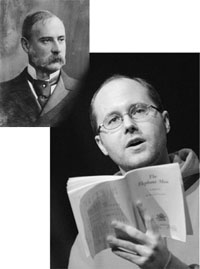By Connie McDougall
Performance Dates for
The Elephant Man
January 25-27, February 1-3
All performances are at 7:30 p.m., with an additional 2:00 p.m. matinee on
Saturday, February 3. For tickets,
call 206/281-2959.
![]() SPU's production of The Elephant Man focuses on a period in the
life of the 19th century physician Frederick Treves, played by Matthew
Blackwell Kinney (right). The historical photo of Treves was provided by
the Library of the College of Physicians of Philadelphia.
SPU's production of The Elephant Man focuses on a period in the
life of the 19th century physician Frederick Treves, played by Matthew
Blackwell Kinney (right). The historical photo of Treves was provided by
the Library of the College of Physicians of Philadelphia.

Spiritual Crisis
Merrick made a living as a carnival freak, until he was "rescued" by Dr.
Frederick Treves, who
brought him to London Hospital. Treves raised funds that allowed Merrick to
live in the hospital
permanently, and he became a cause celebre in London society. In spite of
his infirmity, Merrick
was described as having great intelligence and gentle ways. He apparently
had artistic skill as
well. With only one good arm and hand, he learned to paint and build
intricate models of churches.
Merrick died in London Hospital at the age of 27. Dr. Treves wrote about the
young man: "One
thing that always struck me as sad about Merrick was the fact that he could
not smile. Whatever
his delight may be his face remained expressionless. He could weep, but he
could not smile."
Even so, the story of Merrick and Treves is not depressing, says Seattle
Pacific University
Professor Emeritus James Chapman. He emphasizes that people should not
confuse the well-known
movie The Elephant Man with the play by the same name. "The movie
concentrated on stark
reality and was grim, but the play is very different," says Chapman. "It has
high aspirations.
There's a lot of humor in it, and there's a focus on human values and
spiritual growth. The
play asks the question, 'What is normal?'"
While the movie focused on Merrick and his pain, the play deals with Dr.
Treves' growing
spiritual crisis. As a result, normalcy is set on its ear, says Chapman. The
doctor, successful
and ambitious, is spiritually bankrupt. The hideous and malformed Merrick
develops true humanity.
"So the audience ends up asking, 'What is normal?'" says Chapman. "We all
make assumptions about
people based on things like beauty, race and material possessions. And those
assumptions may or
may not be right."
Because the play centers on a process of spiritual growth, it seemed perfect
for Homecoming,
Chapman notes. "Alumni are coming back to their academic 'home.' They'll see
a play that is not
just entertaining, but that truly does 'engage the culture.' I believe
they'll take away
something meaningful."
The play is also relevant to the Common Curriculum, a series of seven
courses required of all
SPU students. In University Core 1000 (UCOR), all freshmen will read the
play and take part
in a plenary session led by the theatre faculty. The students will then
attend a performance,
later discussing it in class.
Theatre Department Chair Don Yanik, who designed the set for The Elephant
Man, believes
the play fits the Common Curriculum well. "In UCOR, we want to explore
questions such as,
'What does it mean to be human?' 'How do Christianity and art interact?' and
'What choices
does an artist make?' All of these issues come together in this play."
Daniel Flint, a 1995 Seattle Pacific theatre graduate who plays Merrick in
the production,
agrees there is plenty for the audience to wrestle with. "We all want to be
accepted, to
be normal. Ultimately, The Elephant Man is a witty and uplifting
story about
metamorphosis," he says.
Flint doesn't wear a costume or makeup to create the look of malformed
limbs. Rather, the
character's ailment is suggested by contortions of the body, an acting
challenge that
Flint finds deeply moving. "I thought about what it would be like to be
Merrick -- this
romantic soul trapped in a deformed body."
Flint says he felt sorrow as well as compassion.
Seattle actor Matthew Blackwell Kinney approaches the role of Dr. Treves
with a degree of
sympathy. "I think the doctor is trying to perform his duties with the tools
he's been
given," says Kinney. "At first he's very removed, but he changes." Indeed,
the ability
to change and grow underscores the play's relevance, he adds. "Change is a
big part of
the college experience, and this play illustrates that extremely well."
Performance Dates for The Elephant Man Most people know something about the story of Joseph Merrick, "The Elephant
Man." Born
in England in 1860, Merrick suffered a disease that left him horribly
disfigured. He wrote in
his autobiography that his deformation was caused by his mother being
frightened by an elephant
when she was pregnant. Modern scientists now believe he suffered from a rare
disease called
Proteus Syndrome, which causes abnormal bone and skin growth.
Most people know something about the story of Joseph Merrick, "The Elephant
Man." Born
in England in 1860, Merrick suffered a disease that left him horribly
disfigured. He wrote in
his autobiography that his deformation was caused by his mother being
frightened by an elephant
when she was pregnant. Modern scientists now believe he suffered from a rare
disease called
Proteus Syndrome, which causes abnormal bone and skin growth.
January 25-27, February 1-3
All performances are at 7:30 p.m., with an additional 2:00 p.m. matinee on
Saturday, February 3.
For tickets, call 206/281-2959.
![]()

| Please
read our
disclaimer.
Send any questions, comments or correspondence about Response to
jgilnett@spu.edu or call 206-281-2051. Copyright © 2001 University Communications, Seattle Pacific University.
Seattle Pacific University |